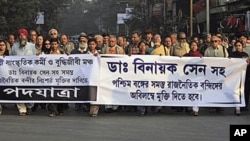An Indian high court has delayed until next month a decision on granting bail to Indian children's doctor Binayak Sen. Sen was sentenced to life in prison last month for his alleged role in assisting anti-government Maoist insurgents. A senior United Nations envoy says, however, his case may be symptomatic of a much larger problem of human-rights abuse in India.
The Indian pediatrician was in court for two days this week, seeking bail as he appeals last month's life sentence by a court in the Indian state of Chattisgarh. The state's high court decided, though, to delay any further discussion of the matter until next month.
Last month's sentencing of Dr. Sen has drawn statements of outrage from human-rights advocates around the world, who say he deserves praise for his work in improving the health of some of India's poorest toddlers and infants. His accusers say he helped pass messages and make financial arrangements for a Maoist militant movement that has killed thousands of people since it arose in 1967.
Ugandan lawyer Margaret Sekaggya was appointed by the United Nations more than two years ago as a special investigator for human-rights defenders around the world. She said that Sen certainly appears to fit that description.
"The evidence shows that he was a human-rights defender," said Sekaggya. "He is advocating for human rights."
Sekaggya said the U.N. should be concerned about India's inconsistent use of security laws meant to combat insurgency and terrorism.
"I am deeply concerned about the arbitrary application of security laws at the national and state level, which directly affects the work of human rights defenders," said Sekaggya. "I am troubled by the branding and stigmatization of human-rights defenders, who are labeled as Maoists, terrorists, militants, insurgents, anti-nationalists, members of [the] underground."
Opponents of India's anti-terror laws say they are too wide-ranging, and too easily politicized for use against those who point out embarrassing truths about rampant inequality and exploitation. Supporters say law enforcers need extraordinary measures because India faces extraordinary threats, from Maoist militants in the Northeast, to Pakistani-backed operatives in the state of Jammu and Kashmir.
Sekaggya said she acknowledges the security challenges faced by the Indian government. "The issue is, how do you balance between security and the rights of the people? And the freedom of the people?"
European Union delegates are closely monitoring Sen's appeal, and Sekaggya said the United Nations will, as well.
"We would ask the government to give due process," said Sekaggya. "We are waiting for the outcome. We want to see how the case is going to be handled."
Sen is scheduled to be in court again on February 9.




